John Locke Akperlinova Aliya 043 -2 group

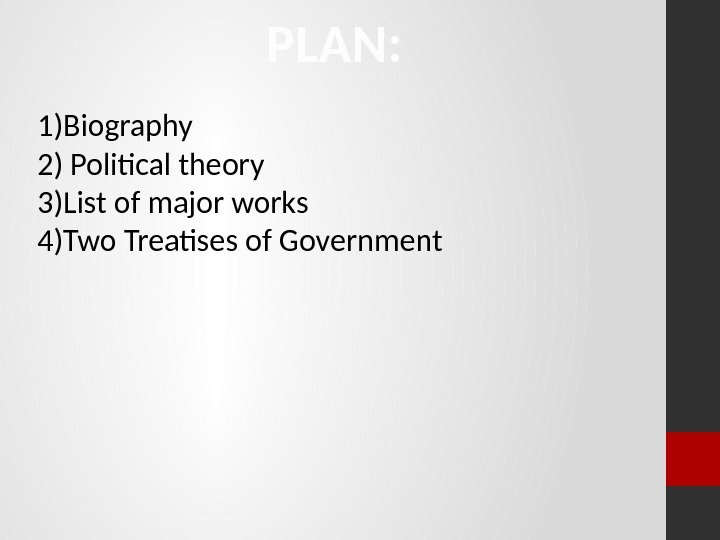
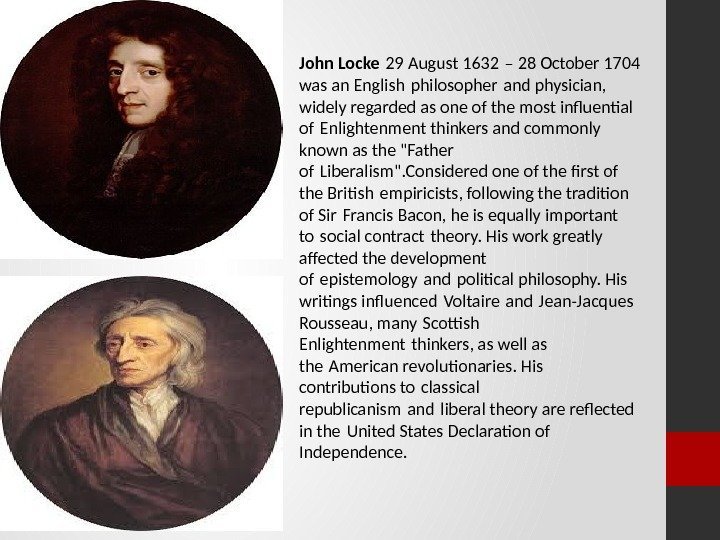
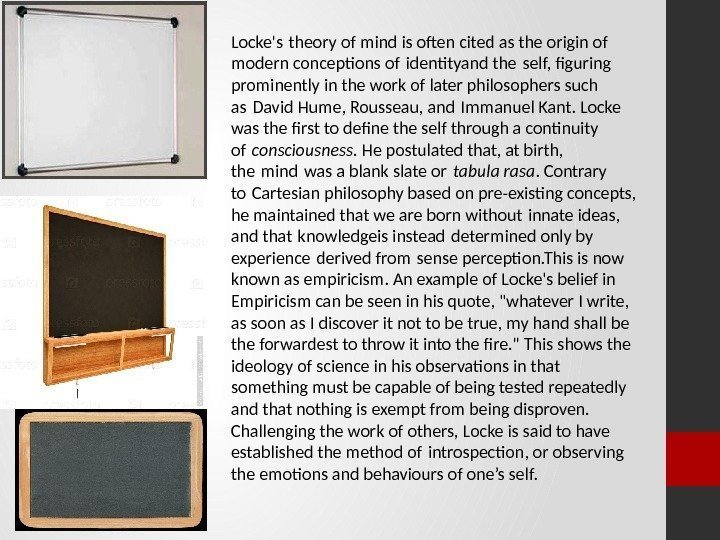
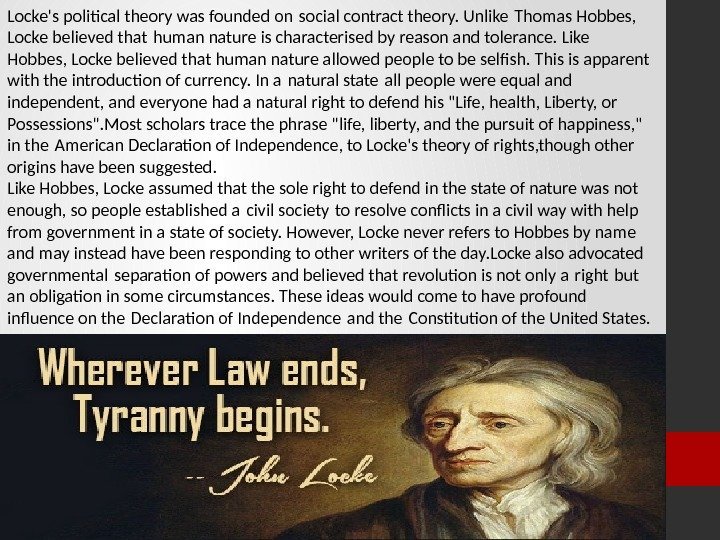
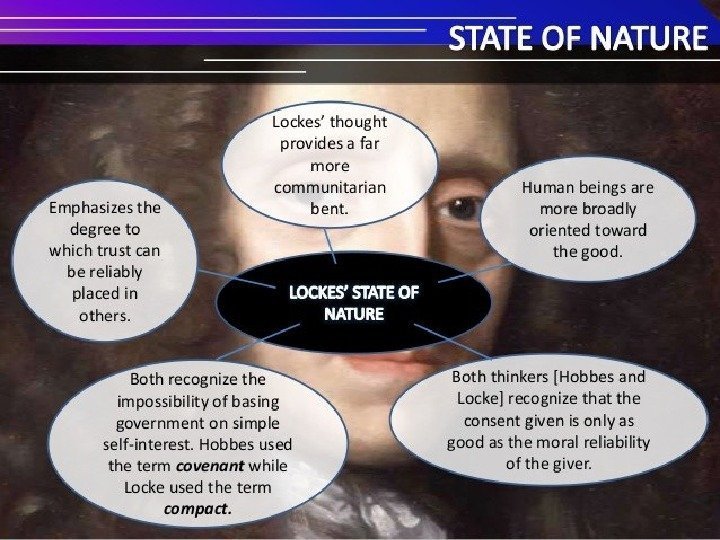
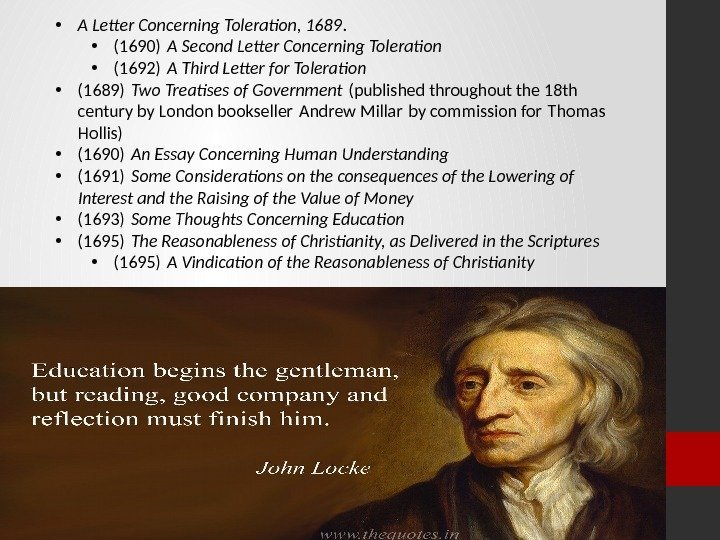
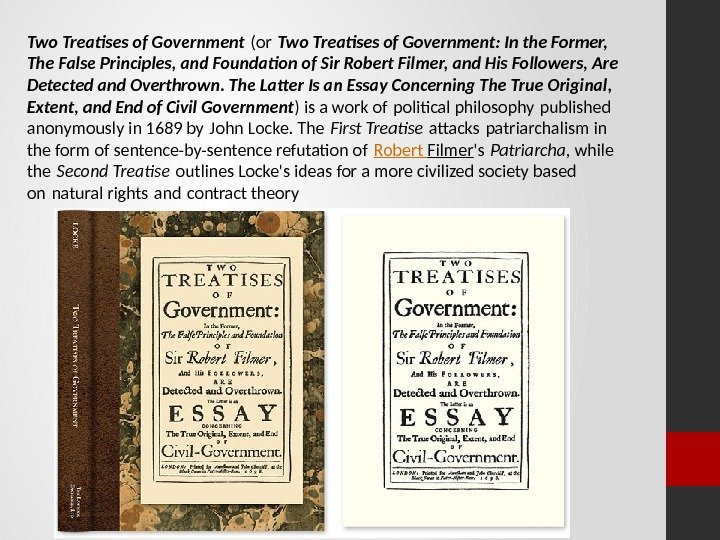
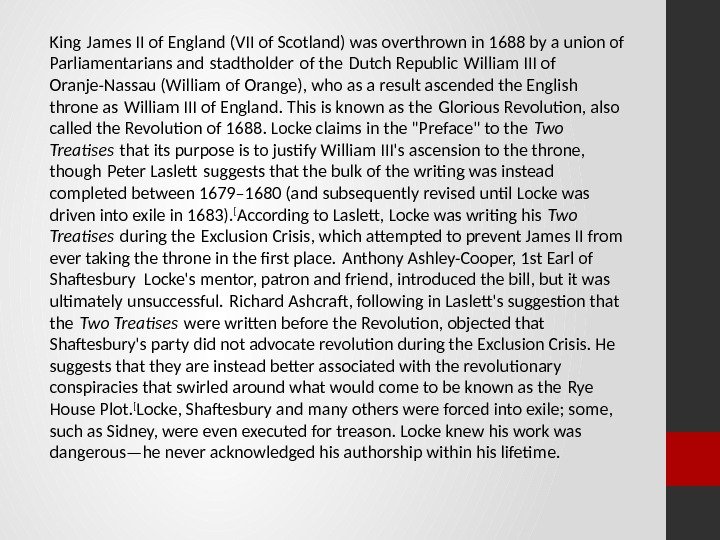

john_locke.pptx
- Размер: 756.2 Кб
- Автор: Marshall Mathers
- Количество слайдов: 10
Описание презентации John Locke Akperlinova Aliya 043 -2 group по слайдам
 John Locke Akperlinova Aliya 043 -2 group
John Locke Akperlinova Aliya 043 -2 group
 PLAN: 1)Biography 2) Political theory 3)List of major works 4)Two Treatises of Government
PLAN: 1)Biography 2) Political theory 3)List of major works 4)Two Treatises of Government
 John Locke 29 August 1632 – 28 October 1704 was an English philosopher and physician, widely regarded as one of the most influential of Enlightenment thinkers and commonly known as the «Father of Liberalism». Considered one of the frst of the British empiricists, following the tradition of Sir Francis Bacon, he is equally important to social contract theory. His work greatly affected the development of epistemology and political philosophy. His writings influenced Voltaire and Jean-Jacques Rousseau, many Scotsh Enlightenment thinkers, as well as the American revolutionaries. His contributions to classical republicanism and liberal theory are reflected in the United States Declaration of Independence.
John Locke 29 August 1632 – 28 October 1704 was an English philosopher and physician, widely regarded as one of the most influential of Enlightenment thinkers and commonly known as the «Father of Liberalism». Considered one of the frst of the British empiricists, following the tradition of Sir Francis Bacon, he is equally important to social contract theory. His work greatly affected the development of epistemology and political philosophy. His writings influenced Voltaire and Jean-Jacques Rousseau, many Scotsh Enlightenment thinkers, as well as the American revolutionaries. His contributions to classical republicanism and liberal theory are reflected in the United States Declaration of Independence.
 Locke’s theory of mind is ofen cited as the origin of modern conceptions of identityand the self, fguring prominently in the work of later philosophers such as David Hume, Rousseau, and Immanuel Kant. Locke was the frst to defne the self through a continuity of consciousness. He postulated that, at birth, the mind was a blank slate or tabula rasa. Contrary to Cartesian philosophy based on pre-existing concepts, he maintained that we are born without innate ideas, and that knowledgeis instead determined only by experience derived from sense perception. This is now known as empiricism. An example of Locke’s belief in Empiricism can be seen in his quote, «whatever I write, as soon as I discover it not to be true, my hand shall be the forwardest to throw it into the fre. » This shows the ideology of science in his observations in that something must be capable of being tested repeatedly and that nothing is exempt from being disproven. Challenging the work of others, Locke is said to have established the method of introspection, or observing the emotions and behaviours of one’s self.
Locke’s theory of mind is ofen cited as the origin of modern conceptions of identityand the self, fguring prominently in the work of later philosophers such as David Hume, Rousseau, and Immanuel Kant. Locke was the frst to defne the self through a continuity of consciousness. He postulated that, at birth, the mind was a blank slate or tabula rasa. Contrary to Cartesian philosophy based on pre-existing concepts, he maintained that we are born without innate ideas, and that knowledgeis instead determined only by experience derived from sense perception. This is now known as empiricism. An example of Locke’s belief in Empiricism can be seen in his quote, «whatever I write, as soon as I discover it not to be true, my hand shall be the forwardest to throw it into the fre. » This shows the ideology of science in his observations in that something must be capable of being tested repeatedly and that nothing is exempt from being disproven. Challenging the work of others, Locke is said to have established the method of introspection, or observing the emotions and behaviours of one’s self.
 Locke’s political theory was founded on social contract theory. Unlike Thomas Hobbes, Locke believed that human nature is characterised by reason and tolerance. Like Hobbes, Locke believed that human nature allowed people to be selfsh. This is apparent with the introduction of currency. In a natural state all people were equal and independent, and everyone had a natural right to defend his «Life, health, Liberty, or Possessions». Most scholars trace the phrase «life, liberty, and the pursuit of happiness, » in the American Declaration of Independence, to Locke’s theory of rights, though other origins have been suggested. Like Hobbes, Locke assumed that the sole right to defend in the state of nature was not enough, so people established a civil society to resolve conflicts in a civil way with help from government in a state of society. However, Locke never refers to Hobbes by name and may instead have been responding to other writers of the day. Locke also advocated governmental separation of powers and believed that revolution is not only a right but an obligation in some circumstances. These ideas would come to have profound influence on the Declaration of Independence and the Constitution of the United States.
Locke’s political theory was founded on social contract theory. Unlike Thomas Hobbes, Locke believed that human nature is characterised by reason and tolerance. Like Hobbes, Locke believed that human nature allowed people to be selfsh. This is apparent with the introduction of currency. In a natural state all people were equal and independent, and everyone had a natural right to defend his «Life, health, Liberty, or Possessions». Most scholars trace the phrase «life, liberty, and the pursuit of happiness, » in the American Declaration of Independence, to Locke’s theory of rights, though other origins have been suggested. Like Hobbes, Locke assumed that the sole right to defend in the state of nature was not enough, so people established a civil society to resolve conflicts in a civil way with help from government in a state of society. However, Locke never refers to Hobbes by name and may instead have been responding to other writers of the day. Locke also advocated governmental separation of powers and believed that revolution is not only a right but an obligation in some circumstances. These ideas would come to have profound influence on the Declaration of Independence and the Constitution of the United States.

 • A Letter Concerning Toleration, 1689. • (1690) A Second Letter Concerning Toleration • (1692) A Third Letter for Toleration • (1689) Two Treatises of Government (published throughout the 18 th century by London bookseller Andrew Millar by commission for Thomas Hollis) • (1690) An Essay Concerning Human Understanding • (1691) Some Considerations on the consequences of the Lowering of Interest and the Raising of the Value of Money • (1693) Some Thoughts Concerning Education • (1695) The Reasonableness of Christianity, as Delivered in the Scriptures • (1695) A Vindication of the Reasonableness of Christianity
• A Letter Concerning Toleration, 1689. • (1690) A Second Letter Concerning Toleration • (1692) A Third Letter for Toleration • (1689) Two Treatises of Government (published throughout the 18 th century by London bookseller Andrew Millar by commission for Thomas Hollis) • (1690) An Essay Concerning Human Understanding • (1691) Some Considerations on the consequences of the Lowering of Interest and the Raising of the Value of Money • (1693) Some Thoughts Concerning Education • (1695) The Reasonableness of Christianity, as Delivered in the Scriptures • (1695) A Vindication of the Reasonableness of Christianity
 Two Treatises of Government (or Two Treatises of Government: In the Former, The False Principles, and Foundation of Sir Robert Filmer, and His Followers, Are Detected and Overthrown. The Latter Is an Essay Concerning The True Original, Extent, and End of Civil Government ) is a work of political philosophy published anonymously in 1689 by John Locke. The First Treatise atacks patriarchalism in the form of sentence-by-sentence refutation of Robert Filmer ‘s Patriarcha , while the Second Treatise outlines Locke’s ideas for a more civilized society based on natural rights and contract theory
Two Treatises of Government (or Two Treatises of Government: In the Former, The False Principles, and Foundation of Sir Robert Filmer, and His Followers, Are Detected and Overthrown. The Latter Is an Essay Concerning The True Original, Extent, and End of Civil Government ) is a work of political philosophy published anonymously in 1689 by John Locke. The First Treatise atacks patriarchalism in the form of sentence-by-sentence refutation of Robert Filmer ‘s Patriarcha , while the Second Treatise outlines Locke’s ideas for a more civilized society based on natural rights and contract theory
 King James II of England (VII of Scotland) was overthrown in 1688 by a union of Parliamentarians and stadtholder of the Dutch Republic William III of Oranje-Nassau (William of Orange), who as a result ascended the English throne as William III of England. This is known as the Glorious Revolution, also called the Revolution of 1688. Locke claims in the «Preface» to the Two Treatises that its purpose is to justify William III’s ascension to the throne, though Peter Laslet suggests that the bulk of the writing was instead completed between 1679– 1680 (and subsequently revised until Locke was driven into exile in 1683). [ According to Laslet, Locke was writing his Two Treatises during the Exclusion Crisis, which atempted to prevent James II from ever taking the throne in the frst place. Anthony Ashley-Cooper, 1 st Earl of Shafesbury Locke’s mentor, patron and friend, introduced the bill, but it was ultimately unsuccessful. Richard Ashcraf, following in Laslet’s suggestion that the Two Treatises were writen before the Revolution, objected that Shafesbury’s party did not advocate revolution during the Exclusion Crisis. He suggests that they are instead beter associated with the revolutionary conspiracies that swirled around what would come to be known as the Rye House Plot. [ Locke, Shafesbury and many others were forced into exile; some, such as Sidney, were even executed for treason. Locke knew his work was dangerous—he never acknowledged his authorship within his lifetime.
King James II of England (VII of Scotland) was overthrown in 1688 by a union of Parliamentarians and stadtholder of the Dutch Republic William III of Oranje-Nassau (William of Orange), who as a result ascended the English throne as William III of England. This is known as the Glorious Revolution, also called the Revolution of 1688. Locke claims in the «Preface» to the Two Treatises that its purpose is to justify William III’s ascension to the throne, though Peter Laslet suggests that the bulk of the writing was instead completed between 1679– 1680 (and subsequently revised until Locke was driven into exile in 1683). [ According to Laslet, Locke was writing his Two Treatises during the Exclusion Crisis, which atempted to prevent James II from ever taking the throne in the frst place. Anthony Ashley-Cooper, 1 st Earl of Shafesbury Locke’s mentor, patron and friend, introduced the bill, but it was ultimately unsuccessful. Richard Ashcraf, following in Laslet’s suggestion that the Two Treatises were writen before the Revolution, objected that Shafesbury’s party did not advocate revolution during the Exclusion Crisis. He suggests that they are instead beter associated with the revolutionary conspiracies that swirled around what would come to be known as the Rye House Plot. [ Locke, Shafesbury and many others were forced into exile; some, such as Sidney, were even executed for treason. Locke knew his work was dangerous—he never acknowledged his authorship within his lifetime.
 T h a n ks fo r att e nti o n !
T h a n ks fo r att e nti o n !
